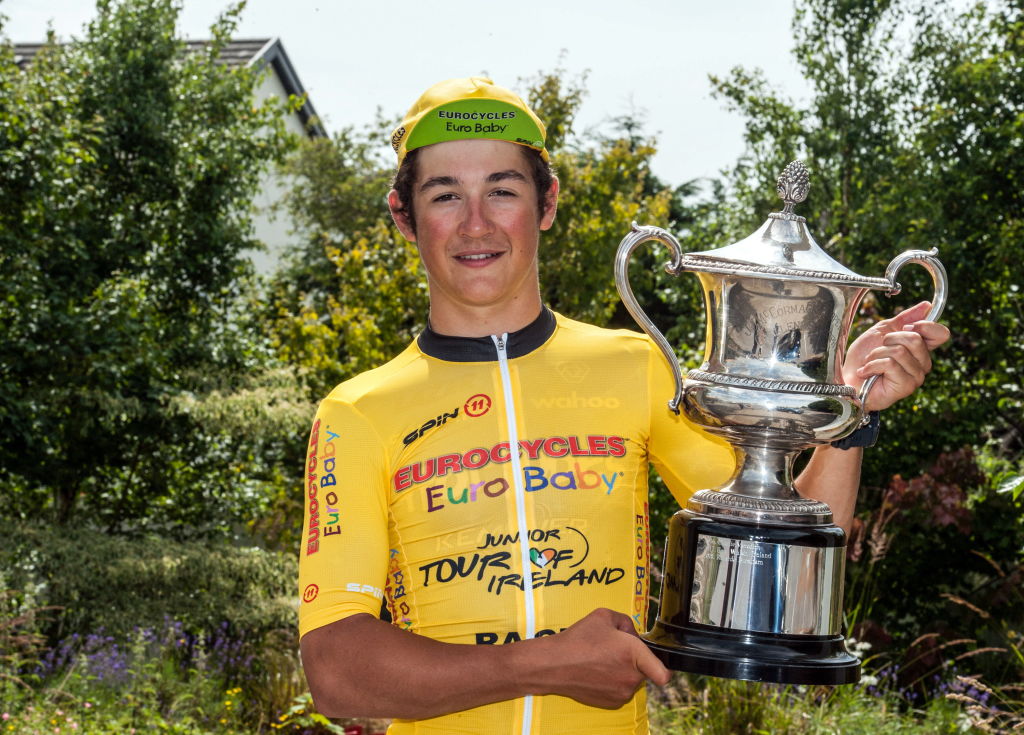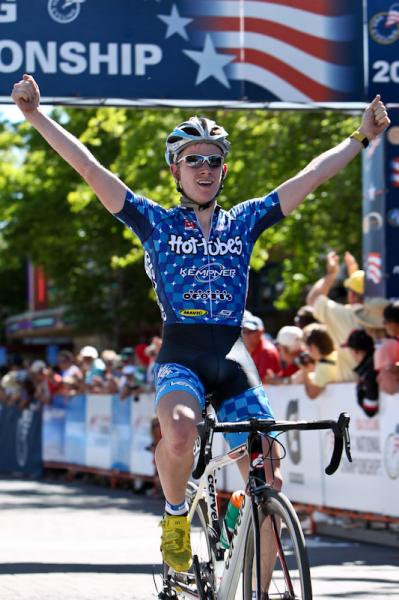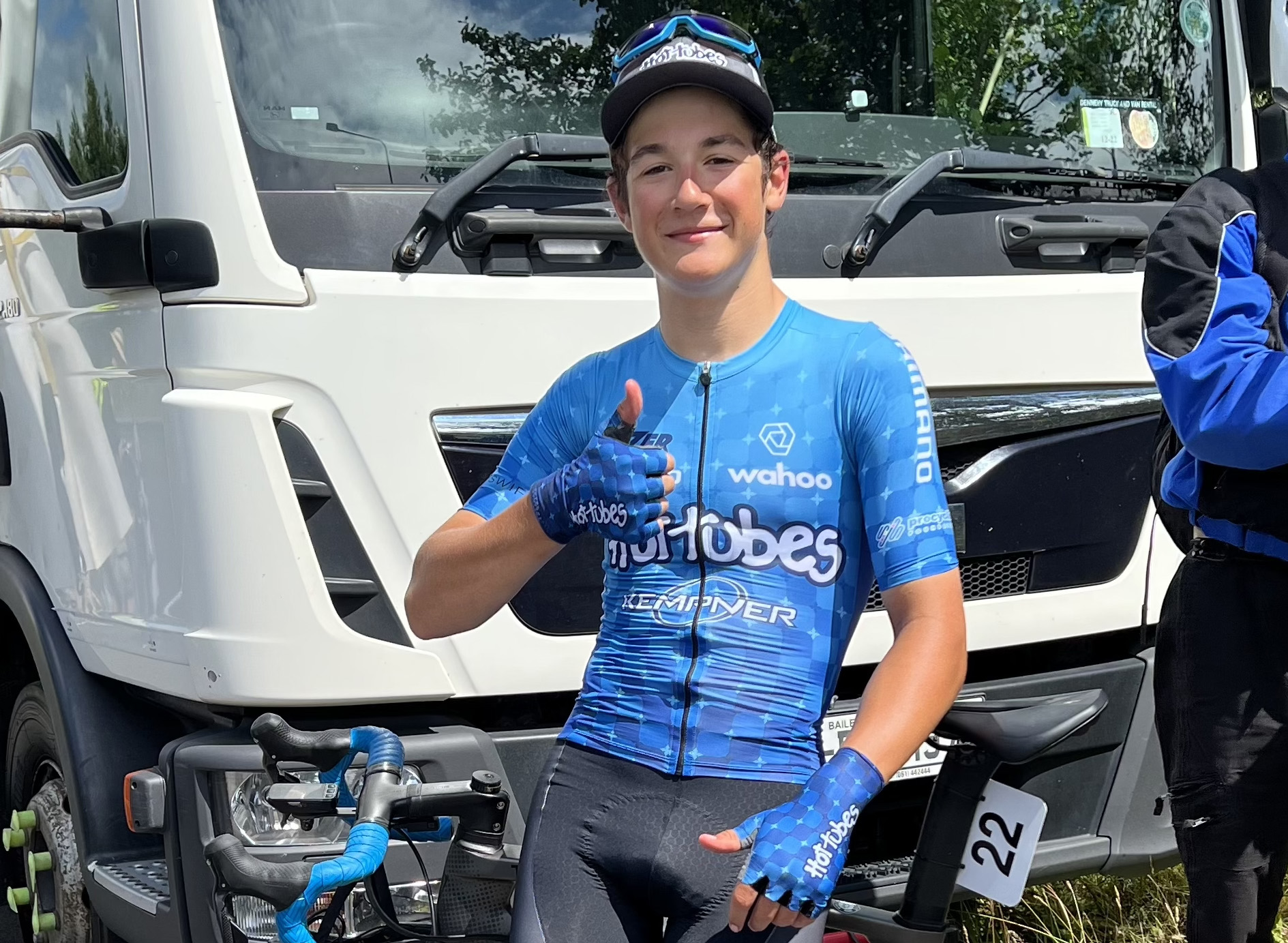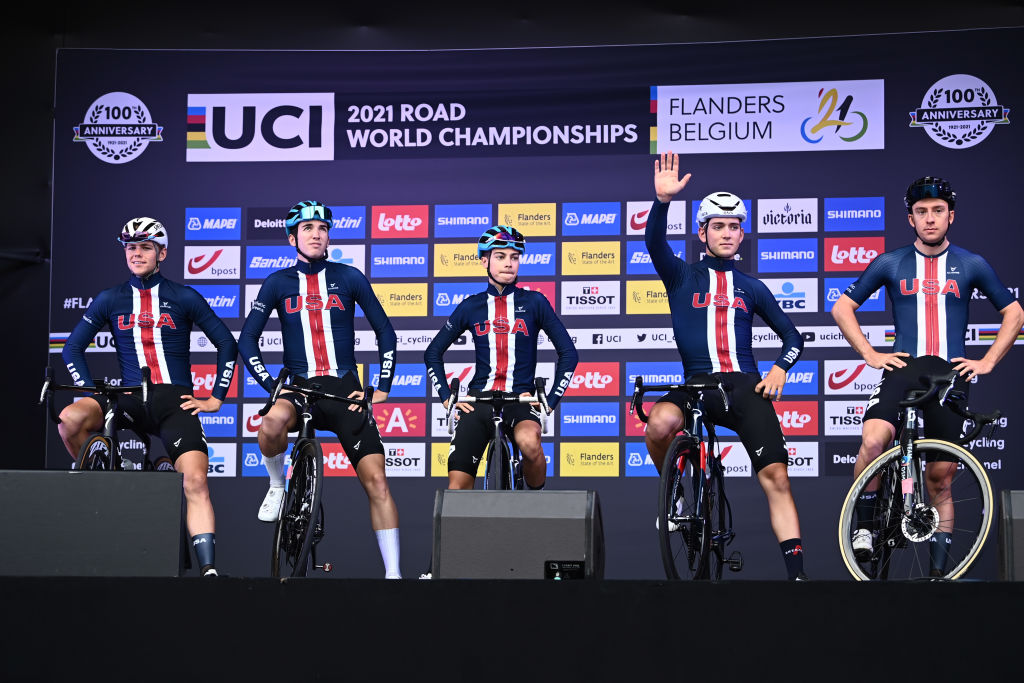Hot Tubes – A 30 year history, powerful development record and founder that's 'kind of got some magic'
A closer look a the North American junior team that helped set Sheffield, Craddock, Jorgenson and August on WorldTour path

What do Magnus Sheffield, Matteo Jorgenson, Ian Boswell, Lawson Craddock and new Ineos Grenadiers recruit AJ August have in common? They all came up through the same junior programme - the Hot Tubes Development team - one of the longest-running devo teams in the USA.
Toby Stanton's Hot Tubes team helped to shape hundreds of athletes and has arguably the best track record of seeing riders head to the WorldTour in recent years. Although the team hasn't taken on many junior girls, an exception is Emma White, who trained with the team and went on to become an Olympic medalist on the track for Team USA.
There are other junior development programmes across the USA in places like Colorado, California, New York and Virginia but Hot Tubes has had a long run and an extensive track record of setting riders on the path to becoming pro cyclists, plus Stanton has the same enthusiasm today as when he started the team in the 1990s.
For 30 years, Stanton has carefully handpicked a small group of junior riders and taken them to races across the USA and in Europe. Opening his riders' eyes to the experience of racing in places like France and Belgium is one of the things that has kept him going.
"Every year, [it is like] Christmas morning with a house full of five-year-olds - they're excited," Stanton tells Cyclingnews. "They haven't done these races before - they can't wait for the flight - everything about it is exciting. That's still a lot of fun for me."
His team has, by his count, 125 national championship titles, from the first by Jonathan Page in 1994 through to this year's junior 17-18 road victory by Darren Parham.
How Stanton produces this level of success year in and year out is a combination of consistent funding and support and treating personal development as equally important to athletic development.
Get The Leadout Newsletter
The latest race content, interviews, features, reviews and expert buying guides, direct to your inbox!
"Toby's kind of got some magic," Will Frischkorn, who sits on the team's board of directors and scored the team their first international victory at the Tour de l'Abitibi in 1998, tells Cyclingnews.
The passion that Stanton brings to the team and the sport is easy to see, even if he is a bit older and more subdued than the fiery tobacco-chewing director of the early years of the team.
Lawson Craddock, who raced with the team from 2009 to 2010, says, "Toby has his own special way of finding and developing and nurturing talent. It almost feels like it has very little to do with your ability to ride the bike and more developing the person behind it. I think that's what probably sets Hot Tubes apart from most development teams."
Jesse Anthony raced with Toby's team when it was the Saturn junior and under-23 team in the early 2000s. Even after years as USA Cycling's director of cyclocross, he sees Stanton as a stand-out example of a director.
"He's always in it for the athletes - he's not in it for himself," Anthony tells Cyclingnews. "I think the biggest difference in Toby is he's always focused on character over performance.
"He gets a little proud once in a while. He's accomplished a lot ... but he always keeps his ego in check, and has always made it about the riders."
Anthony describes Stanton as gregarious, animated, and excitable but also generous and genuine. "If you meet him, you think he thinks he's God's greatest gift, but the way he actually acts lives and runs the team is without ego... Actions speak louder than words.
"Winning is important to him, that guy is competitive as heck. But he knows you're gonna win or lose, and there are so many factors that go into that, but what you can change is how you conduct yourself, what kind of person you become.
"When you're talking about 17-year-old kids - you have no idea how long he's gonna stay in the sport - you see hundreds of kids come through his programme and then quit. And he's fine with that, because he knows that he can have an impact on them and their lives."
'Don't crash the #&$@^! van!'

It seems that Stanton's most lasting influence on his young riders is his sense of trust and willingness to let them take on responsibilities without interfering, only coming in to correct them when they make mistakes.
He describes a few instances where he's stopped himself from shouting advice to riders during races, letting them figure it out on the road, and having them surprise him with their success: Frischkorn slipped into a breakaway at Tour de l'Abitibi and stole the overall win, Curtis White took on the senior riders in a pro criterium and beat them, Gage Hecht defeated race-favourite Brandon McNulty at the national championships.
One quote stands out when describing his decision to hold off telling Curtis White what to do: "I realised, I have to trust him to know what to do because how was he ever going to learn to be trustworthy until he's trusted?"
Craddock gives an example of how Stanton kept the bigger picture in the mix.
"I remember a lot of times where we'd go up to stay at his house in the summer, and instead of leading us on big training rides, he would just bring us to someone's house and make us clean up their derelict backyard... Stuff that doesn't necessarily translate to training, but it definitely gives you a good foundation to build your entire life off of."
Anthony tells the story of a time when Stanton tossed the keys to his van to his group of teenage teammates and let them drive themselves 1,000 miles from Massachusetts to Wisconsin for the Superweek series of criteriums.
"He was like, 'All right guys, just don't crash the fucking van!'. We took off and we had a crazy road trip. It was hilarious - we had a lot of fun. We got there, we didn't crash the van. It all worked out. At the time you think it's normal because you're an 18-year-old kid, then you realise years later - did he do that on purpose?
"He did that on purpose. He knew that would be a life experience for us, he knew we were gonna do stupid shit like moon people on the freeway - that's not professional, but, be a damn kid. Because you have to be so disciplined in the sport and you have to follow the rigid life in so many other ways, you've got to live sometimes. I think that's what is so underrated - that Toby is aware of that stuff."
As with any aspect of life, the team isn't always fun and games, Craddock says.
"There have been times that Toby wasn't fun and nice, he's had to crack the whip on us, which is sometimes exactly what a teenager needs. A lot of that is just guidance. There were times when he sat us down and put the fear of god into us. Maybe you're sitting there at the time and you think, 'Oh, this is terrible. I hate this', but you look back on it - you're so impressionable at such a young age and you realise it's so important to have the right people around you and the right support group to help guide you in that journey."
How it started, how it's going

Stanton raced until 1989 when family life became incompatible with the sport, and he was working in a bike shop when some local junior racers asked if they could drive them to races. One of them, Jonathan Page, went on to win national championships and become the most-decorated American in cyclocross.
That was the start of 32 years of dedication to the riders - every success built more passion and motivation to continue. As part of the local shop club, the team was once sponsored by Wonder Bread and wore jerseys that looked a lot like what Will Farrell's character wore in the movie, Talladega Nights: The Ballad of Ricky Bobby. Stanton's team had a stint as part of the Century Road Club of New York City, as GS Mengoni, then part of the Saturn organisation but ultimately he wanted to do his own thing.
It's not an easy task developing talent in the USA, where races are increasingly few and far between and sponsorship is hard to come by. Stanton and coach Brian Walton have plenty of young riders to choose from - this year's Green Mountain Stage Race had 106 junior starters - but there are fewer races for them to do.
While technological changes like video calls and social media have made the trips to Europe a bit less lonely, the cycling lifestyle has become more rigid than when Stanton started out.
"The guys are just so tuned in to diet, training, and recovery - way more than the 90s. The high end is much closer, and there are a lot more guys at the high end. There's not a lot of difference between them until you get some guy with some stupid VO2 or some stupid power level and they stand out even when they race dumb.
"In the old days, if you were strong, you could get away with being dumb. You can't now because there are too many guys too close. And the smart guys are going to beat you and the good teams are always going to beat you."
The recent success of young riders like Tadej Pogačar and Remco Evenepoel, along with other under-23's finding success in the WorldTour like Arnaud De Lie, Olav Kooij, Juan Ayuso and Josh Tarling, and before them Wout van Aert and Mathieu van der Poel, the top of the rankings seems to get younger and younger.
Until recently, it was almost unheard of for juniors to head straight to the WorldTour, now it's become more common, making teams like Hot Tubes not just junior development programmes but feeder teams for the top tier of pro cycling.
"If you asked me five years ago about a junior joining the WorldTour, I'd say there's no way they'd make it three or four years," Craddock says. "I think we're getting to a point where it's becoming more and more of a normality - every year there are quite a few 18-year-olds being brought directly into the WorldTour.
"You can make a case for it and against it: A world-class organisation can provide the best support, the best nutritionist, the best training, the best environment, the best culture and whatnot. But there's something about being 19 years old, and being with guys of a similar age and stage of life.
"If I were to guess at what the future of the sport is going to look like, I'd say careers across the board are going to get shorter and shorter and there will be fewer guys retiring at 38 and more guys returning retiring at 32 or 33. A lot of that is due to the amount of commitment and pressure that we are put under constantly. You have to be top of your game from February to October and that takes its toll."
Finding riders and funding

Even running a small team of juniors, a programme that involves trips to Europe and around North America takes a six-figure budget, and as the WorldTour has seen, raising that kind of money is far harder than finding a quality roster of riders.
Stanton and his board have succeeded in maintaining a consistent level of funding through generous benefactors with donations large and small, and the organisation of the team into a non-profit has ensured that there is impartial oversight. Financial reports show that the team leadership withdraws an extremely modest salary, leaving the vast majority of the budget for the riders.
Will Frischkorn joined the team after some lobbying from his father Carl, and the two went on to be important supporters of the programme. It was Carl who helped Stanton to formalize the team into a 501 (c)(3) non-profit organisation and sat on the board until he unexpectedly passed away in 2020.
Remembering Carl Frischkorn, Stanton chokes up a bit. "He was much more than just the chairman of the board of the team ... I could talk to him about anything, and I did. He was just the best sort of dad that I didn't have. He cared about everything that we did, a lot."
Will remains involved with the team as a board member, and chimed in to make sure he got a message across that he knew Stanton wouldn't.
"I think there's this assumption out there that that Hot Tubes is this super-funded junior team. It's not. Toby still scratches it together with an incredibly modest budget.
"Toby does this because he loves it. It's not financially driven. The people that have donated - even small amounts, but for 20 years running, they all are invested in the programme. They feel really proud of the kids - it's a pretty cool way to be able to help the future of American cycling."
The future of American cycling

Despite the reduced calendar of racing, made even tougher by the pandemic, the USA have had a great run of success with Sepp Kuss, Neilson Powless, Jorgenson, Craddock, Sheffield, Brandon McNulty, Larry Warbasse, Kevin Vermaerke, Quinn Simmons, Will Barta, Matthew Riccitello and Joe Dombrowski all in the WorldTour. Next season they'll be joined by Luke Lamperti and AJ August.
With the Hot Tubes team's reputation for contributing to the pro pipeline, Stanton doesn't have to work hard to find riders but he continues to go by intuition when it comes to selecting the team each year.
Coach Brian Walton looks at their numbers from training to measure physical potential, but Stanton uses his impression of the riders more than their athletic prowess in selecting the team. "I don't have a formula, I just still feel it."
He seems to find riders who are like sponges, soaking up all of the training, race tactics, team dynamics and life lessons and even if they don't become top pros, they take something away from their time with the team.
Magnus Sheffield, in a recent interview, noted that Stanton's philosophy had stayed with him.
"Apparently when he was coming on the team, I asked him, 'Are you prepared to lose so that someone else on the team can win?'," Stanton explains. "Being a guy like Magnus who can win anything, he had never been forced to think about that. And he said that that forms how he approaches everything he does within Ineos now... If the [Hot Tubes] team has something to do with that I'm glad. That's what I want out of this team is those moments...
"Magnus is going to influence a whole lot of people, which is way bigger than anything I do. And the same with AJ, the same with Matteo."
Stanton intends to keep going as long as he is able with the team. "I want it to keep existing I want these opportunities to be there for more young guys. And I want more teams like mine in the US," he says. "So I'm trying to help. I tried to help Roy [Knickman] when he was starting Lux and Rusty Miller when he's doing his EF programme, and Drew Kogan, he runs the Velosport team out of California.
"I can give him all of the hard lessons that took me 20 years so he can learn through me and doesn't have to make all these same mistakes. And I think it's working because collectively, American racing is getting better - the riders are getting smarter, they're understanding what matters and what doesn't, and understanding that just being strong isn't enough, that's not a complete racer, you got to be all of these other things."
Stanton is making sure his riders have all of the 'other things' and the riders' appreciation shows in their pride as alumni - some using the motto 'Hot Tubes 4 Life'.
Craddock sums it up best.
"I think one of the best things that I feel like Toby did was harness everyone's individual abilities and finding a way to put that focus on how they believe they should succeed, and moulding into something that helps them succeed.
"We're completely different individuals on the team, but we were taught to work as a team, and to get along with each other and to help each other out. We also made sure everyone had their own opportunity. So it's a unique environment within the team. I think Toby is a fantastic leader and the team has been around for over 30 years now, so obviously, he's doing something right."

Laura Weislo has been with Cyclingnews since 2006 after making a switch from a career in science. As Managing Editor, she coordinates coverage for North American events and global news. As former elite-level road racer who dabbled in cyclo-cross and track, Laura has a passion for all three disciplines. When not working she likes to go camping and explore lesser traveled roads, paths and gravel tracks. Laura specialises in covering doping, anti-doping, UCI governance and performing data analysis.